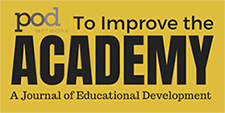Professional and Organizational Development Network in Higher Education

To Improve the Academy: A Journal of Educational Development
Date of this Version
2004
Document Type
Article
Citation
To Improve the Academy: A Journal of Educational Development (20) 2; doi: http://dx.doi.org/10.3998/tia.17063888.0022.013http://dx.doi.org/10.3998/tia.17063888.0022.013
Abstract
A common goal of educational development is to create a neutral, “safe” place for clients in individual consultations. Such an approach, while well intentioned, obscures the multifaceted web of power threading through and around our work. Using Michel Foucault’s theories of sovereign and disciplinary power, we trace the forms that power can take in specific types of consultations (small group instructional diagnosis, course evaluations, and videotape). While power is always “dangerous,” it is less likely to be damaging if we are conscious of its presence and impact—and of our own participation in its complexity.
Included in
Curriculum and Instruction Commons, Higher Education Commons, Higher Education Administration Commons, Higher Education and Teaching Commons, Other Education Commons


Comments
License: CC BY-NC-ND